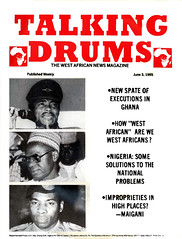Of drinking and national honours
A Touch Of Nokoko
by Kofi Akumanyi
According to a recent television report, the government has mounted a serious campaign to let the Vodka drinking public know that there are other drinks that do not overwork the human system so much but give as much pleasure.
Of course, the major underlying factor for the authorities' displeasure with Vodka consumption is the simple fact that the Soviet economy is suffering from under-productivity. In their scheme of things, behaviour and attitude that have deleterious effects on productivity are not inspired by communist principles.
The answer, we learned was the introduction of Pepsi Cola, one of the strong pillars of capitalist multi-nationals, to dilute the hang-over and other harsh effects of Vodka.
I personally do not know how the Soviet drinking public is going to adapt a capitalist drink but if the experience of my own country, Ghana, is anything to go by, then there is only one sure way of reducing alcoholism, - continue raising the price of a bottle of Vodka until it is completely out of reach of the working classes.
Back in the early 1970's when Ghanaians began to realise that regular price increases with the introduction of every budget had become a permanent feature of the economy, those who love their bottles of cold "Star/Club" beers used to say that no matter how high the price went, they would continue to drink.
They did not reckon with the Rawlings' PNDC government which in the past three years, has increased the price of beer so much that, according to reports, beer drinking is not such a popular sport anymore.
"Why, I used to drink four bottles of beer every evening after work and could easily fit the expenditure in the monthly budget, said my friend, Sammy, "Not any more. At the current prices, I can afford only one bottle and the wonder of it all is that my friends and I can sit around our single bottle each, and talk politics all evening. We're now experts on international affairs!"
And now, to think that some fifteen years ago, there was a hectic debate in the Ghanaian national papers under the then civilian government to introduce opening hours for the country's pubs which are under no restriction and can open any time of the day. The issue, as you might have imagined, died a natural death in Ghana, but it looks as if the British pub operators, ably supported by a strong lobby of Tour operators, He members of Parliament and the Association of Pub Crawlers are determined to change the long- standing traditional opening hours in Britain.
They are pointing to Scotland's all-hours opening tradition as a most successful tourist attraction and are quick to point out that contrary to the alarming opposition to the new opening times which claimed that there has been no increase in alcoholism. In fact, the only slight increase in pub patronage has been attributed to women who have found the new opening times agreeable and joined their men folks.
Having carefully studied all the interesting statistics that have been spewed out to support an all-hours opening, I have been wondering why nobody has delved deeper into the drinking phenomenon to find out whether other drink-related problems had arisen as a result of Scottish women going out to drink - more babies for instance?
A government which has its ears to the ground must necessarily do the wishes of the people and going by the records, Mrs Thatcher, determined to have a third go at the reins of power and realising the recent damaging opinion polls, may push the legislation through for the opening of shops on Sundays and pubs all hours. I am certain that with successful implementation of these "revolutionary" legislation, she may yet win the coveted Woman-of-the-Year' award and thereby have her own back at the snobbish dons of Oxford who refused her an honorary degree this year.
What a fitting tribute the "Woman- of-the-Year" award would be as she would join the ranks of the likes of General Muhammadu Buhari who was recently accorded a "Man-of-the-year 1984" honour.
The General was reportedly genuinely surprised by the honour which came from the Board of Directors of the New Nigerian Newspapers Limited. He said he had wanted to reject the award but changed his mind when he saw the composition of the selection committee which he said was made up of eminent Nigerians.
Quipped the Head of State: "It was a year when Nigerians had to queue for virtually everything, including such basic needs as drinking water and common salt."
He was honoured for his outstanding contribution to the development of the nation.
